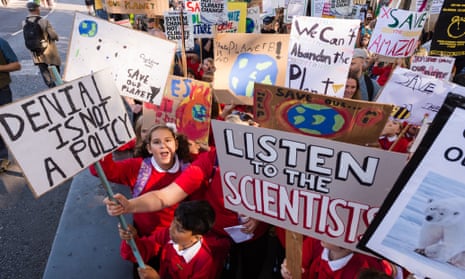We’ve long known that the big fossil fuel companies are responsible for a huge share of the world’s carbon emissions. Now the Climate Accountability Institute is publishing new data quantifying how much each of these has contributed to the climate crisis. We find that, chiefly from the combustion of their products, the top 20 companies have collectively produced 480bn tonnes of carbon dioxide and methane since 1965 – 35% of all fossil fuel emissions worldwide in that time. The worst offenders in the top 10 include Saudi Aramco (number one), Chevron, ExxonMobil, BP and Royal Dutch Shell.
Seven-eighths of emissions attributed to the top 20 carbon producers is from use of their products – petrol, jet fuel, natural gas and coal – and one-eighth from extracting, refining and delivering finished fuels. These carbon fuels are produced and marketed to consumers with the knowledge that they will worsen the climate crisis. For the most part, these companies are ignoring calls to urgently shift investment from exploration and production of carbon fuels to the renewable and alternative technologies required to reduce global emissions in alignment with the science-based target to eliminate net carbon emissions by 2050.
In my view, fossil fuel firms were morally and legally obliged to warn that continued use of carbon fuels threatens our health and welfare, and to accelerate the conversation on how to reduce the threat. Instead the industry has for decades invested millions in climate denial and obfuscation in order to delay legislative action and avoid losing market share.
At the same time oil, natural gas and coal companies have benefited for decades from hundreds of billions in government subsidies incentivising fossil fuel development, as well as regulatory preferences and other taxpayer-funded costs, such as military protection for shipping lanes.
Overall, companies are the beneficiaries of what climate economist Nicholas Stern has called the “greatest market failure the world has seen”. We need to eliminate subsidies and regulatory preferences, and to price carbon so as to “internalise” the vast costs of climate damages now mostly paid by people who did not cause the problem, such as today’s farmers and tomorrow’s children.
Unravelling this tangled web is as complex as it is urgent if we are to avoid the frightening consequences of runaway climate chaos. Nations, cities and business leaders have committed to reducing emissions; protesters around the world are demanding action. I have great hope that emissions will be curbed, but I am concerned that the phenomenally profitable fossil fuel companies have the capital, skills and political clout to outwit any efforts to eliminate emissions by 2050. How can emissions decline to any significant degree if oil, gas and coal companies are committed to actually increasing the supply of fossil fuels?
That’s why we decided to take them on. The Climate Accountability Institute was formed in 2011 to confront fossil fuel companies. We calculated the emissions traceable to their annual production of crude oil, natural gas and coal historically – atmospheric warming is driven chiefly by past emissions and long-term carbon dioxide concentrations – and estimated future emissions based on their proven reserves. We challenged their inadequate plans to reduce the climate impacts of the carbon supply chain. We work with investigators, human rights commissioners, advocates and lawyers in an effort to curb the carbon industry’s enthusiasm for unabated fossil fuel development.
Q&AWhat is the polluters project?
Show
The Guardian has collaborated with leading scientists and NGOs to expose, with exclusive data, investigations and analysis, the fossil fuel companies that are perpetuating the climate crisis – some of which have accelerated their extraction of coal, oil and gas even as the devastating impact on the planet and humanity was becoming clear.
The investigation has involved more than 20 Guardian journalists working across the world for the past six months.
The project focuses on what the companies have extracted from the ground, and the subsequent emissions they are responsible for, since 1965. The analysis, undertaken by Richard Heede at the Climate Accountability Institute, calculates how much carbon is emitted throughout the supply chain, from extraction to use by consumers. Heede said: "The fact that consumers combust the fuels to carbon dioxide, water, heat and pollutants does not absolve the fossil fuel companies from responsibility for knowingly perpetuating the carbon era and accelerating the climate crisis toward the existential threat it has now become."
One aim of the project is to move the focus of debate from individual responsibilities to power structures – so our reporters also examined the financial and lobbying structures that let fossil fuel firms keep growing, and discovered which elected politicians were voting for change.
Another aim of the project is to press governments and corporations to close the gap between ambitious long-term promises and lacklustre short-term action. The UN says the coming decade is crucial if the world is to avoid the most catastrophic consequences of global heating. Reining in our dependence on fossil fuels and dramatically accelerating the transition to renewable energy has never been more urgent.
Our data is used by scientists and climate modellers to attribute climate impacts (such as sea level rise and ocean acidification) to each of the 100 fossil fuel companies in our database. It is used by lawyers seeking damages from specific companies for costs to protect or rebuild vulnerable homes and infrastructure from sea level rise, flooding or other attributable effects of climate change.
Fossil fuel companies must not be allowed to sit on the sidelines, professing support for climate action while they continue to contribute to worsening climate chaos. I challenge oil executives to manage their companies in line with the best science on climate change.
The pursuit of next quarter’s profits must be shifted to embrace climate stewardship, or we leave as our legacy a bereft planet and a broken moral compass. We preside over our own future, and we owe it to our descendants and ourselves to eliminate climate change as a threat to our survival well before mid-century. Let’s get on with it.









